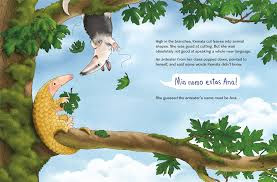"The kids at
their words were different. They spoke a language
Kemala didn't know.
"Do they speak our language?" she asked her mama.
"No," Mama whispered, "but, we'll catch on."
Kemala is super excited to discover everything about this brand-new town where she and her mother are living. She likes the shopping, the foods, the smells, the babies, the money, even the hats the ladies wear. She is very excited when the two arrive at her new school. Kemala is a talker, and she cannot wait to make friends with her schoolmates. Welcomed by her teacher, her shyness fades and she talks and talks to no avail. No one understands a word she is saying. The tiny pangolin curls into a tight ball to ease her nervous stomach.
It doesn't get better at recess. Kemala finds comfort in a nearby tree ... where she meets Ana, a friendly anteater. Without words, Kemala can show Ana what she is cutting from the leaves that surround them. Ana is not adept. She is keen to try her hand and show her work when they return to the classroom. Once home, Kemala happily shares school news with her mama and then, her concern about learning a whole new language.
Kemala and Ana spend time making animals from thick paper and green leaves. Ana's skills improve as she practices. The two work together with their puppets to tell stories; Kemala without words, and Ana always sharing in words Kemala does not yet understand. A very special gift from Ana has Kemala wanting to share a story from home. She doesn't have all the words she needs. Still, she invites her classmates to a puppet show. Despite a few mistakes, her classmates cheer her attempt. The puppet show is a huge success. Only a few words that night lead her to add more and more every day. Most exciting of all is her new friend. Amiko!
Using Esperanto as the language for the children in Kemala's new classroom is a wonderful device for all readers, who will feel much the same as she does. Brightly-colored, pleasing images give the book a feeling of warmth, kindness, and understanding.
Closing pages provide information about Esperanto, a glossary of phrases used, and some additional details about pangolins.













No comments:
Post a Comment